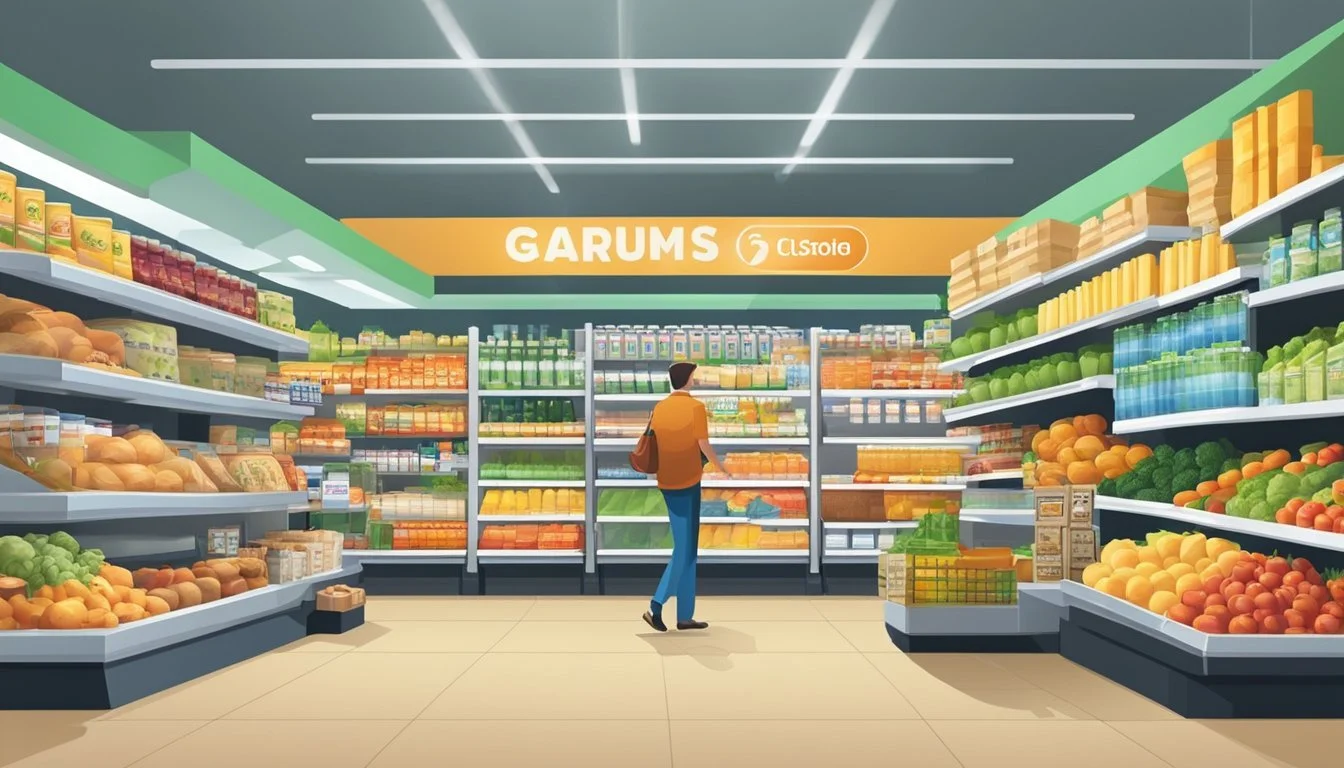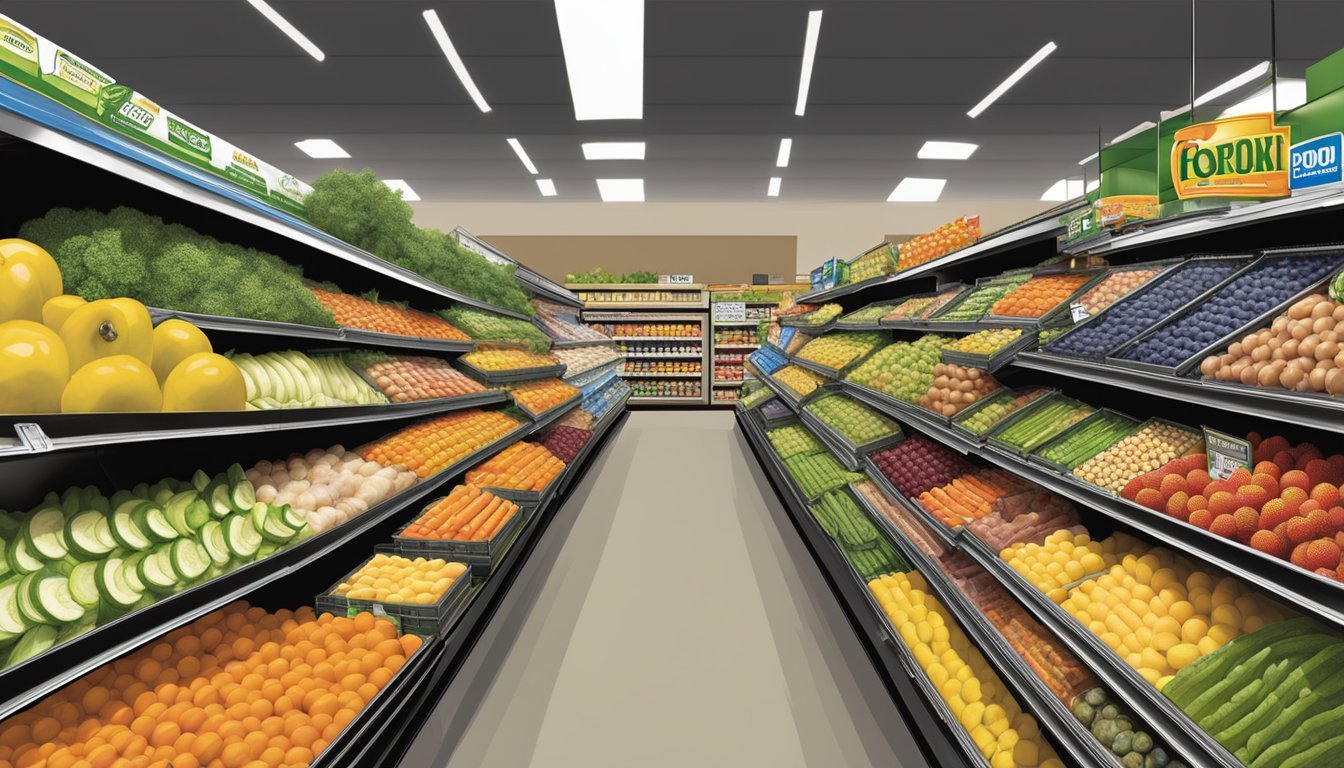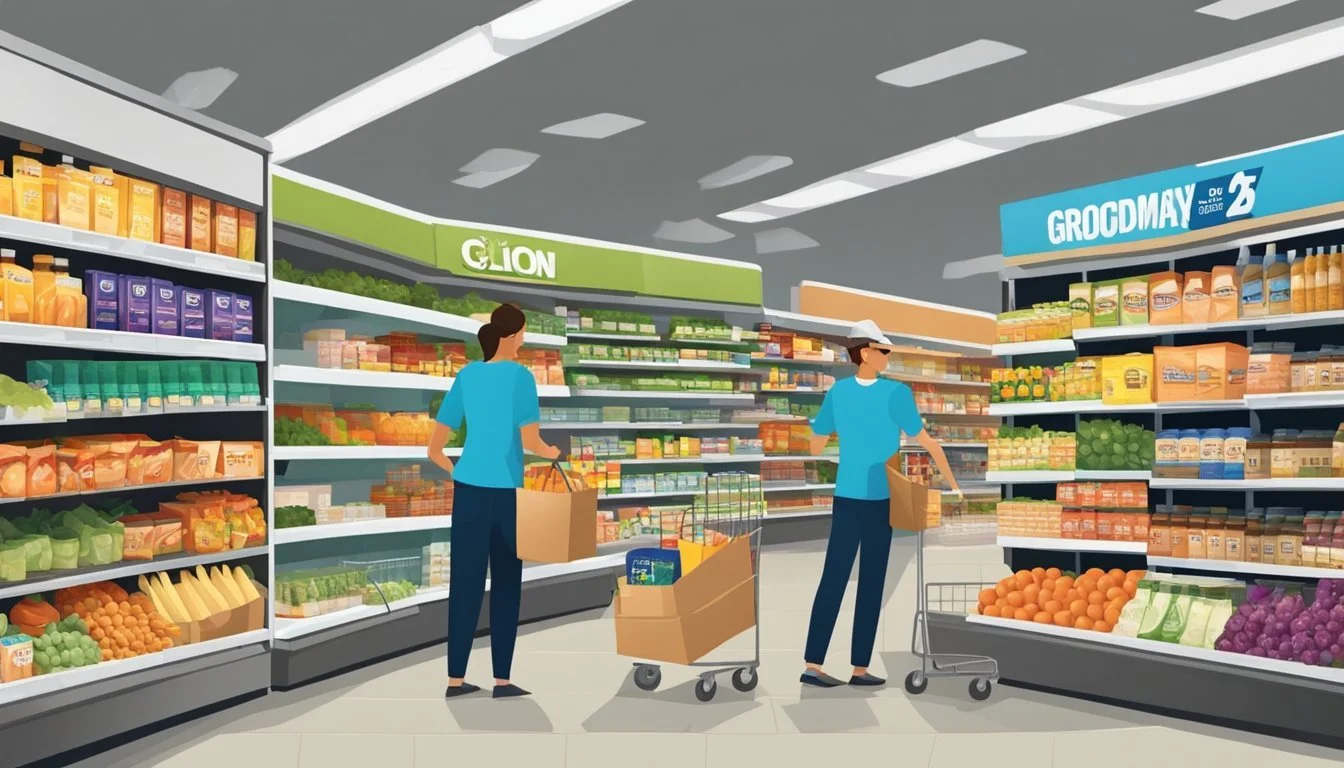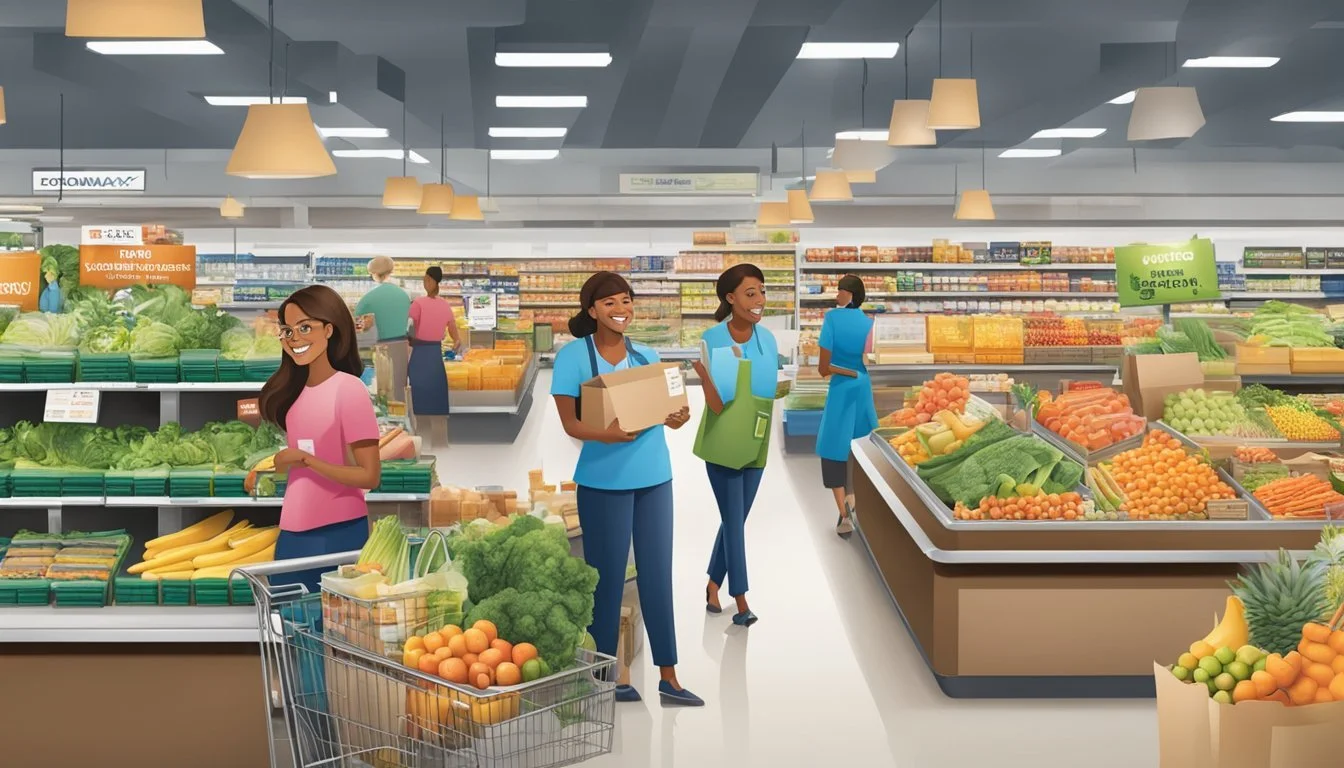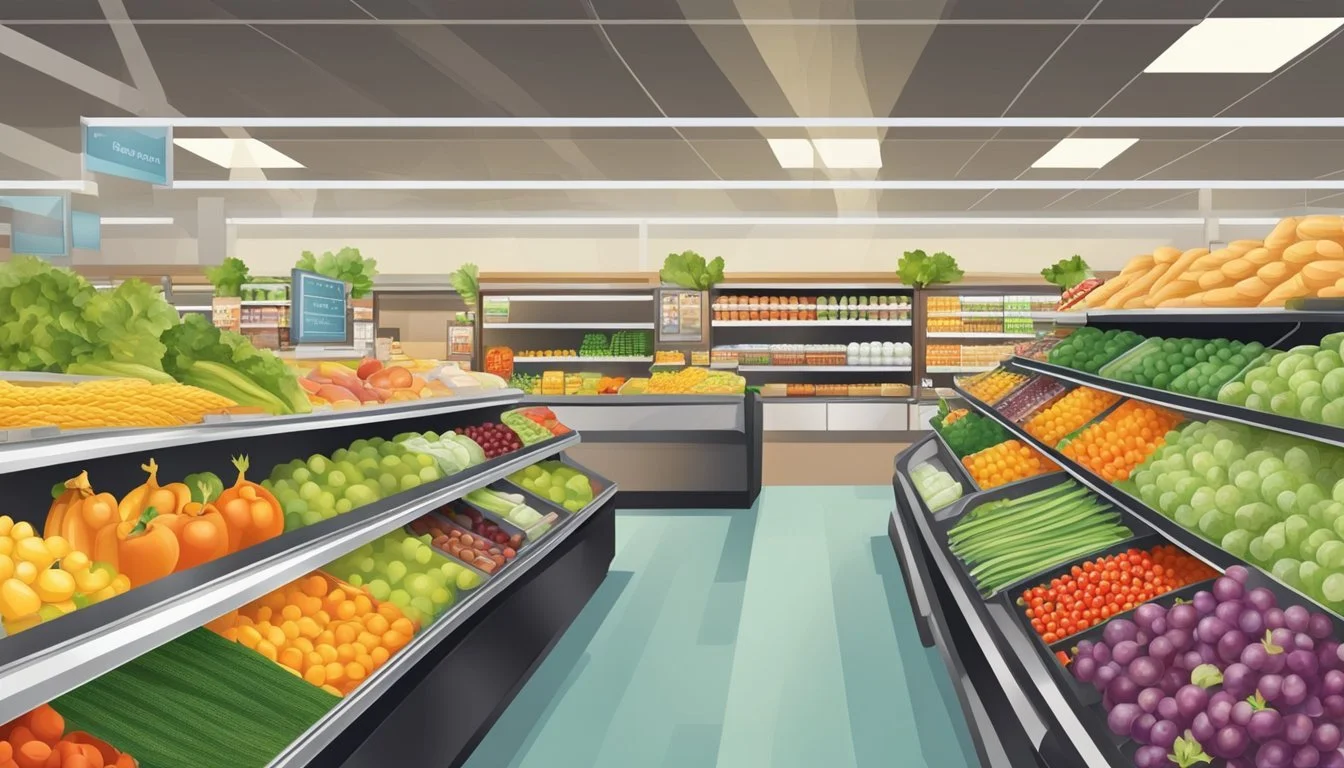Food Lion vs FoodMaxx
Comparing Prices, Quality, and Selection
Grocery shopping is an essential part of everyday life, and choosing the right store can make a significant difference in both your budget and shopping experience. Food Lion and FoodMaxx are two popular grocery chains that offer competitive prices and a wide range of products.
Both Food Lion and FoodMaxx provide substantial savings compared to average grocery prices, with FoodMaxx offering prices up to 21% lower than the all-store average in some areas. This difference can translate to significant savings for families who spend a considerable amount on groceries each week.
While price is a crucial factor, other aspects like product quality, store locations, and available services also play important roles in determining which store is better for individual shoppers. Food Lion, with over 1,000 stores in ten states, offers a large selection of private-label products that often match the quality of bigger brands at lower prices. FoodMaxx, on the other hand, is known for its competitive pricing and no-frills shopping experience.
History and Overview of Food Lion and FoodMaxx
Food Lion and FoodMaxx are two prominent grocery store chains in the United States. They have distinct origins and growth trajectories that have shaped their market presence today.
Origins of Food Lion
Food Lion began as Food Town in 1957 in Salisbury, North Carolina. Wilson Smith, Ralph Ketner, and Brown Ketner founded the company as a single-store operation. The business introduced the LFPINC (Lowest Food Prices in North Carolina) concept in 1967, which fueled rapid expansion.
In 1974, Belgian grocer Delhaize acquired Food Town. This acquisition provided resources for further growth. The company rebranded as Food Lion in 1983 to facilitate expansion beyond North Carolina.
Under Tom Smith's leadership, who started as a grocery bagger in the 1950s and became CEO in 1986, Food Lion experienced significant growth.
The Growth of FoodMaxx
FoodMaxx operates as a warehouse-style grocery store chain. It was established as a discount supermarket format by Save Mart Supermarkets in the 1980s. The company aimed to offer lower prices through a no-frills shopping experience.
FoodMaxx stores typically feature a warehouse-style layout with products displayed on pallets or in their original shipping boxes. This approach reduces labor costs and allows for competitive pricing.
The chain has primarily focused its growth in California and Nevada. FoodMaxx stores are known for their wide selection of ethnic foods, catering to diverse communities.
Grocery Store Market Presence
Food Lion has a strong presence in the southeastern and mid-Atlantic regions of the United States. As of 2024, it operates over 1,000 stores across 10 states. The chain is known for its fresh produce and convenient locations.
Food Lion is now part of Ahold Delhaize, a Dutch multinational retailer formed in 2016. This ownership provides Food Lion with additional resources and synergies within a larger grocery network.
FoodMaxx maintains a more regional focus, with approximately 50 stores primarily in California. The chain competes by offering lower prices on a wide range of products, including bulk items and international foods.
Both stores face competition from larger national chains and must continually adapt to changing consumer preferences and market conditions.
Store Comparison by Location and Accessibility
Food Lion and FoodMaxx operate in different regions, impacting their accessibility to consumers. Their geographical distribution and proximity to residential areas play key roles in customer convenience.
Geographical Distribution
Food Lion maintains a strong presence in the southeastern and mid-Atlantic United States. The chain operates over 1,000 stores across 10 states, including North Carolina, Virginia, and Georgia. This concentrated regional focus allows Food Lion to tailor its offerings to local preferences.
FoodMaxx, a subsidiary of Save Mart Supermarkets, primarily serves California and Nevada. With around 50 locations, FoodMaxx has a more limited geographical footprint compared to Food Lion. The chain focuses on urban and suburban areas in these two states.
Convenience and Proximity to Consumers
Food Lion's wider distribution provides greater accessibility for customers in its operating regions. The chain often places stores in both urban and rural areas, aiming to serve diverse communities. Many Food Lion locations are situated in neighborhood shopping centers, making them convenient for quick trips.
FoodMaxx tends to position its stores in densely populated urban and suburban areas. This strategy caters to budget-conscious shoppers in high-traffic locations. While FoodMaxx has fewer total stores, its focus on populous areas means many customers live within a short drive of a location.
Both chains prioritize easy access, but Food Lion's larger network gives it an edge in overall convenience for customers in its service areas.
Price Analysis and Affordability
Food Lion and FoodMaxx both aim to provide affordable grocery options, but their pricing strategies differ. Comparing costs across common items, discount programs, and special deals reveals key distinctions between the two chains.
Common Items and Basket Cost Comparison
A typical grocery basket at Food Lion tends to be moderately priced. Their "MVP Card" program offers additional savings on select items. FoodMaxx, on the other hand, maintains consistently low prices across most products.
A comparison of staple items like milk, bread, eggs, and produce shows FoodMaxx often comes out slightly cheaper. For example:
Gallon of milk: FoodMaxx $2.99, Food Lion $3.29
Loaf of bread: FoodMaxx $1.79, Food Lion $2.19
Dozen eggs: FoodMaxx $2.49, Food Lion $2.79
These small differences can add up over time, potentially saving FoodMaxx shoppers $5-10 per week on average.
Savings Programs and Discounts
Food Lion's MVP Card offers personalized coupons and weekly specials. Members earn points on purchases, redeemable for discounts on future shopping trips. The program also provides access to digital coupons and exclusive deals.
FoodMaxx takes a different approach. They focus on everyday low prices rather than extensive loyalty programs. However, they do offer digital coupons through their website and mobile app. These coupons can be loaded directly to a shopper's account for automatic savings at checkout.
Both stores provide senior discounts on certain days, typically offering 5% off purchases for customers aged 60 and above.
Loss Leaders and On-Sale Items
Food Lion regularly features "Hot Sale" items, often pricing popular products below cost to attract customers. These loss leaders change weekly and are prominently displayed in store circulars and advertisements.
FoodMaxx employs a similar strategy with their "Truckload Sale" events. These sales offer deep discounts on bulk purchases of seasonal or overstocked items. While less frequent than Food Lion's weekly specials, these events can provide significant savings for shoppers willing to buy in larger quantities.
Both stores mark down perishable items nearing expiration dates. Food Lion typically does this daily, while FoodMaxx tends to have set days for such markdowns.
Product Range and Quality
Food Lion and FoodMaxx offer distinct product ranges and quality levels to cater to different customer preferences. Both stores strive to provide affordable options while maintaining varying degrees of selection and freshness.
Variety of Options in Food Lion vs FoodMaxx
Food Lion typically stocks a wider variety of products compared to FoodMaxx. Food Lion carries around 28,000 items, including national brands and their own private label products. FoodMaxx, as a discount grocer, focuses on a more limited selection of about 15,000 items to keep costs down.
Food Lion's private label, "Nature's Promise," offers organic and natural options across various categories. FoodMaxx, on the other hand, emphasizes bulk purchases and discounted name brands.
Both stores carry essential grocery items, but Food Lion generally provides more specialty and gourmet products.
Organic and Health Choices
Food Lion has made significant strides in expanding its organic and health-focused offerings. Their "Nature's Promise" line includes over 1,000 organic, free-from, and natural items across produce, meat, dairy, and pantry staples.
FoodMaxx's organic selection is more limited, focusing on basic produce items and select packaged goods. While they offer some health-conscious options, the variety is not as extensive as Food Lion's.
Food Lion also provides a dedicated gluten-free section and clearly labels allergen-free products, making it easier for customers with dietary restrictions to shop.
Meat and Produce Quality
Food Lion generally receives higher marks for produce quality and freshness compared to FoodMaxx. They source from local farms when possible and have implemented a "double your money back" guarantee on produce items.
FoodMaxx's produce quality can be inconsistent, reflecting their focus on lower prices. However, they do offer a selection of fresh fruits and vegetables at competitive rates.
In terms of meat, Food Lion provides a broader range of cuts and quality levels, including premium and organic options. FoodMaxx typically offers standard cuts at budget-friendly prices, with less emphasis on premium or specialty meats.
Food Lion's meat department often includes a service counter, while FoodMaxx usually relies on pre-packaged options to reduce costs.
Store Brand Comparison
Food Lion and FoodMaxx offer their own store brands to provide value-oriented options for customers. These private label products aim to compete with national brands on quality while maintaining lower prices. Customer perceptions and ratings play a key role in determining which store brand delivers better overall value.
Food Lion Brand vs FoodMaxx Offerings
Food Lion's private label includes the "Food Lion" brand for everyday essentials and "Nature's Promise" for organic and natural products. Their selection spans most grocery categories, from produce to pantry staples. FoodMaxx offers the "First Street" brand, covering a wide range of products across departments.
Food Lion emphasizes fresh produce in its store brand, often matching national brand quality at lower prices. FoodMaxx focuses on providing bulk sizes and multi-packs of their private label items to appeal to budget-conscious shoppers.
Both chains offer money-back guarantees on their store brands, demonstrating confidence in product quality.
Consumer Perception and Ratings
Customer surveys indicate generally positive reception for both Food Lion and FoodMaxx store brands. Food Lion's emphasis on fresh produce quality in its private label appears to resonate with shoppers.
FoodMaxx's "First Street" brand receives praise for its competitive pricing, especially on pantry staples and household goods. However, some customers note inconsistent quality across different product categories.
Online ratings show Food Lion's store brand averaging slightly higher scores than FoodMaxx's offerings. This may be partly due to Food Lion's larger store footprint and more established brand presence in certain regions.
Taste tests conducted by consumer groups have found both chains' private labels to be comparable to national brands in many categories, with some products even outperforming more expensive alternatives.
Shopping Experience and Amenities
Food Lion and FoodMaxx offer distinct shopping environments tailored to their target customers. Both chains prioritize efficiency and value, but implement these priorities differently in their store layouts and customer service approaches.
Cleanliness and Store Layout
Food Lion stores typically feature a bright, open layout with wide aisles and clear signage. The chain emphasizes cleanliness, with regular floor cleaning and well-maintained shelves. Produce sections are often near the entrance, showcasing fresh fruits and vegetables.
FoodMaxx adopts a no-frills warehouse-style layout. Aisles may be narrower, with bulk items and large displays. The focus is on maximizing space for inventory rather than aesthetic appeal. While clean, FoodMaxx stores may appear less polished than Food Lion due to their utilitarian design.
Both chains organize products logically, but Food Lion tends to offer a more traditional grocery store flow. FoodMaxx's layout can require more exploration, as items are sometimes grouped by case size rather than category.
Customer Service and Support
Food Lion invests in customer service training, aiming for friendly and helpful staff interactions. Cashiers are typically quick and efficient. The chain offers various support options, including in-store customer service desks and responsive phone support.
FoodMaxx operates with a leaner staff model to keep costs down. This can result in fewer employees available on the floor for assistance. Checkout lines may move quickly due to the focus on efficiency, but personalized help might be less readily available.
Both stores provide basic amenities like shopping carts and baskets. Food Lion often includes additional services such as coin-counting machines or in-store pharmacies at select locations. FoodMaxx typically limits extra amenities to maintain its low-price business model.
Online Shopping and Delivery Services
Food Lion and FoodMaxx have embraced digital technology to enhance customer convenience. Both offer online shopping platforms and various delivery options to cater to modern consumers' needs.
Grocery Delivery Options
Food Lion provides a user-friendly online ordering system through shop.foodlion.com and their mobile app. Customers can choose between pickup and home delivery services. Pickup fees are $1.99 for orders over $35, while delivery costs $3.99.
FoodMaxx partners with Instacart for its online grocery delivery. This service allows customers to shop from home and have items delivered to their doorstep within hours.
Both stores offer same-day delivery options, depending on availability and location. Food Lion's in-house delivery service may provide more consistent pricing, while FoodMaxx's Instacart partnership can offer wider delivery coverage.
Online Deals and Prime Member Advantages
Food Lion integrates its MVP rewards program with online shopping. Digital coupons and personalized deals are available to members shopping through the website or app.
FoodMaxx offers digital coupons through its website, which can be applied to online orders. The store frequently runs online-exclusive promotions to incentivize digital shopping.
Neither store currently offers a Prime-style membership program. However, Food Lion's MVP program provides consistent savings across in-store and online purchases, giving it a slight edge in customer loyalty benefits.
Policies and Shopping Convenience
Food Lion and FoodMaxx offer distinct policies and shopping experiences to cater to their customers' needs. Both stores strive to provide convenient options and customer-friendly policies.
Return Policies and Customer Guarantees
Food Lion implements a "Double Your Money Back Guarantee" on private brand items. Customers can return these products for a full refund plus an equal amount in store credit if unsatisfied. For other items, Food Lion allows returns within 7 days with a receipt.
FoodMaxx has a more limited return policy. They accept returns on non-perishable items within 30 days with a receipt. Perishable goods are generally non-returnable unless spoiled upon purchase.
Both stores reserve the right to limit quantities on sale items to prevent resellers from bulk-buying.
Payment Options and Checkout Efficiency
Food Lion accepts cash, credit cards, debit cards, and EBT. They also offer a mobile app for digital coupons and rewards. Self-checkout lanes are available in many locations to reduce wait times.
FoodMaxx provides similar payment options, including cash, credit, debit, and EBT. They focus on keeping costs low by encouraging cash payments and offering fewer frills at checkout.
Both stores typically have efficient checkout processes with trained cashiers. Food Lion tends to offer more lanes open during peak hours, potentially reducing wait times.
Community Engagement and Brand Reputation
Food Lion and FoodMaxx take different approaches to community involvement and customer trust. Their charitable programs, local initiatives, and overall brand images shape how consumers perceive these grocery chains.
Charitable Programs and Local Involvement
Food Lion operates the Food Lion Feeds program, which has donated over 750 million meals since 2014. The company partners with local food banks and schools to address hunger in communities it serves. Food Lion also supports disaster relief efforts and military families through various initiatives.
FoodMaxx, as part of The Save Mart Companies, participates in community engagement through its Save Mart C.A.R.E.S. Foundation. This foundation focuses on supporting youth development, education, and health and wellness programs in local areas. FoodMaxx stores often host food drives and fundraising events for local charities.
Brand Image and Consumer Trust
Food Lion has worked to rebuild its reputation after facing challenges in the 1990s. The company has invested in store renovations, expanded its product offerings, and improved customer service. These efforts have helped Food Lion regain consumer trust and position itself as a value-oriented, community-focused grocer.
FoodMaxx emphasizes its commitment to providing quality products at low prices. The brand targets budget-conscious shoppers with its warehouse-style stores and no-frills approach. While less focused on building a premium image, FoodMaxx has cultivated a loyal customer base that values its straightforward, cost-effective shopping experience.
Both chains prioritize food safety and quality control to maintain customer trust. Food Lion has implemented rigorous quality assurance programs, while FoodMaxx relies on its parent company's established protocols to ensure product integrity.
Conclusion
Food Lion and FoodMaxx both offer competitive pricing for budget-conscious shoppers. FoodMaxx edges out slightly in overall affordability, with prices around 21% below average compared to Food Lion's 12% lower prices.
Food Lion provides a wider selection of national brands and fresher produce. Their stores tend to be cleaner and offer a more pleasant shopping experience.
FoodMaxx excels in bulk purchases and deeper discounts on select items. Their no-frills approach allows for greater savings, especially for large families.
Loyalty programs differ between the chains. Food Lion's MVP card provides personalized deals and gas rewards. FoodMaxx offers straightforward low prices without a formal rewards system.
Location plays a key role in choosing between these stores. Food Lion has a stronger presence in the Southeast, while FoodMaxx operates primarily in California and Nevada.
The best choice depends on individual priorities. Those seeking the lowest overall prices may prefer FoodMaxx. Shoppers valuing a balance of affordability, selection, and store atmosphere might lean towards Food Lion.
Both chains fulfill their missions of providing budget-friendly grocery options to their respective markets.




